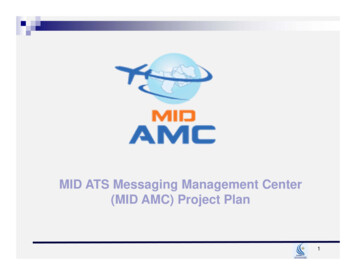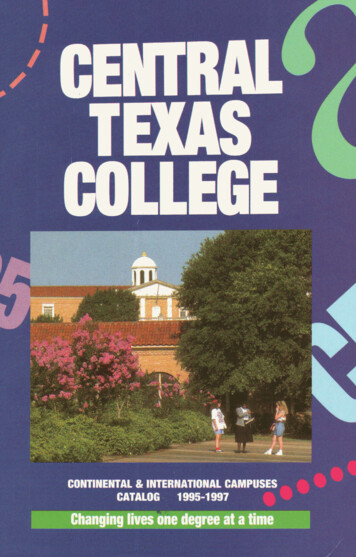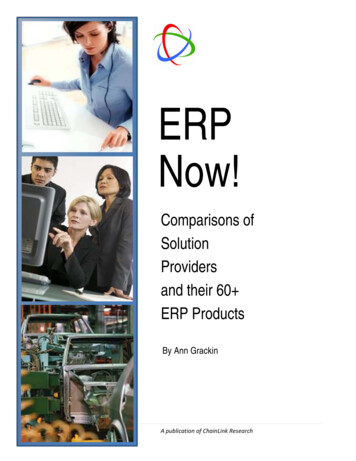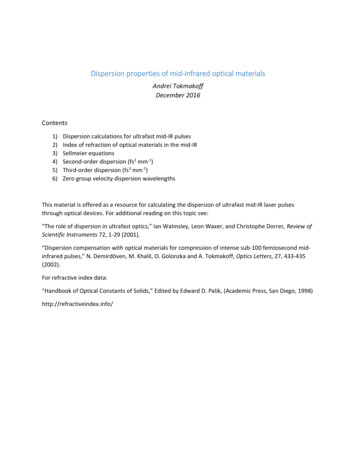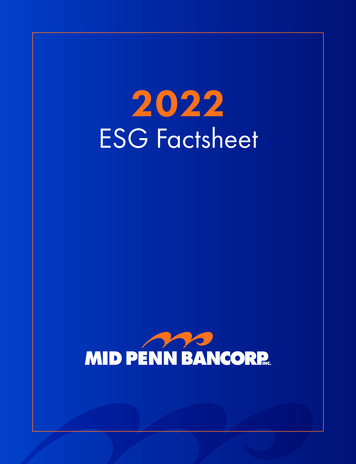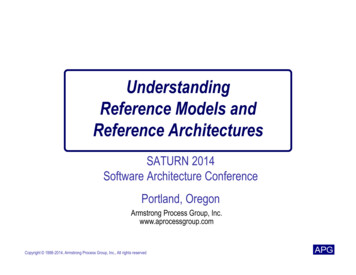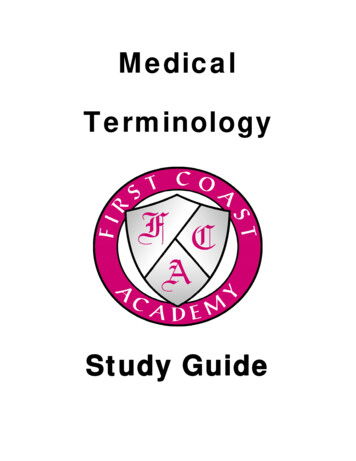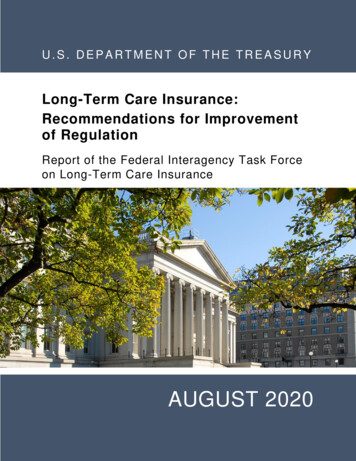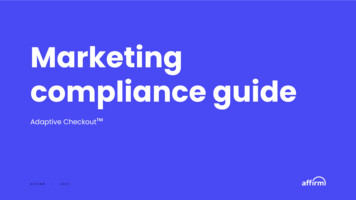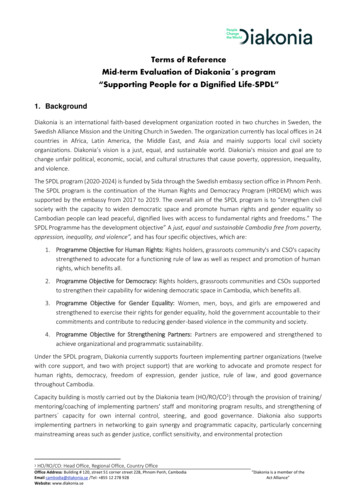
Transcription
Terms of ReferenceMid-term Evaluation of Diakonia s program“Supporting People for a Dignified Life-SPDL”1. BackgroundDiakonia is an international faith-based development organization rooted in two churches in Sweden, theSwedish Alliance Mission and the Uniting Church in Sweden. The organization currently has local offices in 24countries in Africa, Latin America, the Middle East, and Asia and mainly supports local civil societyorganizations. Diakonia’s vision is a just, equal, and sustainable world. Diakonia's mission and goal are tochange unfair political, economic, social, and cultural structures that cause poverty, oppression, inequality,and violence.The SPDL program (2020-2024) is funded by Sida through the Swedish embassy section office in Phnom Penh.The SPDL program is the continuation of the Human Rights and Democracy Program (HRDEM) which wassupported by the embassy from 2017 to 2019. The overall aim of the SPDL program is to “strengthen civilsociety with the capacity to widen democratic space and promote human rights and gender equality soCambodian people can lead peaceful, dignified lives with access to fundamental rights and freedoms.” TheSPDL Programme has the development objective” A just, equal and sustainable Cambodia free from poverty,oppression, inequality, and violence”, and has four specific objectives, which are:1. Programme Objective for Human Rights: Rights holders, grassroots community's and CSO's capacitystrengthened to advocate for a functioning rule of law as well as respect and promotion of humanrights, which benefits all.2. Programme Objective for Democracy: Rights holders, grassroots communities and CSOs supportedto strengthen their capability for widening democratic space in Cambodia, which benefits all.3. Programme Objective for Gender Equality: Women, men, boys, and girls are empowered andstrengthened to exercise their rights for gender equality, hold the government accountable to theircommitments and contribute to reducing gender-based violence in the community and society.4. Programme Objective for Strengthening Partners: Partners are empowered and strengthened toachieve organizational and programmatic sustainability.Under the SPDL program, Diakonia currently supports fourteen implementing partner organizations (twelvewith core support, and two with project support) that are working to advocate and promote respect forhuman rights, democracy, freedom of expression, gender justice, rule of law, and good governancethroughout Cambodia.Capacity building is mostly carried out by the Diakonia team (HO/RO/CO1) through the provision of training/mentoring/coaching of implementing partners' staff and monitoring program results, and strengthening ofpartners capacity for own internal control, steering, and good governance. Diakonia also supportsimplementing partners in networking to gain synergy and programmatic capacity, particularly concerningmainstreaming areas such as gender justice, conflict sensitivity, and environmental protection1HO/RO/CO: Head Office, Regional Office, Country OfficeOffice Address: Building # 120, street 51 corner street 228, Phnom Penh, CambodiaEmail cambodia@diakonia.se /Tel: 855 12 278 928Website: www.diakonia.se”Diakonia is a member of theAct Alliance”
2. Objective and scope of the Mid-term Evaluation (MtE)The objective of the Mid-term Evaluation (MtE) is to evaluate the progress of Diakonia’s programme,Supporting People for Dignified Life - SPDL from 1st January 2020 to 30th September 2022 and assess itsrelevance and effectiveness to contribute to the desired change process identified in Diakonia’s CambodiaCountry Strategy and Theory Of Change. The MtE will appraise the programme's progress and achievementsagainst its overall and specific objectives, and the current implementing partner portfolio and producerecommendations for improvements, particularly in the context of recent socio-political developments inCambodia.3. Assignment rationaleAs a learning organisation, working based on a Theory of Change model, Diakonia sees the MtE as a veryimportant opportunity to evaluate and learn from the first half of the programme period (2020-2022),understand what is working well and what needs to be adjusted in the coming years to maximize the positiveimpact on the chosen change processes. Also, according to the grant agreement between the embassy ofSweden section office in Phnom Penh and Diakonia signed on 3rd April 2020, it is stated that a MtE shall becarried out by the end of 2022 (Article 9.2).4. The MtE purpose: intended usersThe primary intended users of the MtE are the embassy of Sweden section office in Phnom Penh and Diakonia.The implementing partners of the programme could also benefit from, finding, lessons learned andrecommendations from the MtE if its relevant.The MtE will be designed and conducted to enable a report that meets the intended users' needs to bedeveloped. Tenders should elaborate on how this will be ensured in the evaluation process.5. MtE criteria and questionsTo respond to the objective and scope defined in point # 2, the MtE should:A. Assess relevance, performance and progress of the SPDL Programme concerning the resultsframework, including cross-cutting issues such as conflict and environment/climate change.B. Assess the relevance and effectiveness of Diakonia's role and added value as an ally in change,facilitator, connector and co-creator, including as a capacity development provider to implementingpartners. The assessment should look particularly at how different types of implementing partners (interms of size, thematic areas and how well established they are) benefit differently from collaboratingwith Diakonia and each other within the framework of the programme, including in terms of capacitydevelopment and resilience. Another specific question to look at is if and how the larger and longtime standing implementing partners of Diakonia benefit from Diakonia’s added value? What wouldbe the advantages and challenges to growing more if they were to receive direct funding from Sidaas a development partner rather than from Diakonia?C. Assess Diakonia’s partner portfolio, i.e. is the current composition of the implementing partnersrelevant and is it effective and efficient in achieving the program objectives and contributing to thechange processes in the Diakonia country strategy. Particularly, look at the added value of havingwell-established implementing partners and newer emerging organisations within the same program.Diakonia- ToR for SPDL Program Mid-Term Evaluation 2022Page 2 of 5
D. Provide practical recommendations to Diakonia, to adjust and adapt the SPDL programme for theremaining of the programme cycle and beyond. If relevant, some recommendations may be directedto implementing partners of the programme.6. Approach and methods for data collection and analysisIt is expected that the consultants describe and justify an appropriate approach/methodology and methodsfor data collection and analysis in the tender, making sure they include a rights-based approach and a genderperspective in the evaluation process itself. The MtE involves briefly reviewing programming, including crosscutting issues2, implemented by the fourteen local NGO partners of the SPDL programme. The programminginvolves activities in many areas and locations in Cambodia.The consultants should take into consideration appropriate 3 measures for collecting data in cases wheresensitive or confidential issues are addressed and avoid presenting information that may be harmful to somestakeholder groups. Data sources should also be clearly outlined, including the triangulation method.7. Organisation of evaluation managementThis MtE is commissioned and managed by the Diakonia-Cambodia Country Office. In addition to the Diakoniacountry office team, Diakonia regional and head office, and the embassy of Sweden section office in PhnomPenh will be provided the opportunity to comment on the first draft evaluation report. The commissioner willevaluate tenders in consultation with concerned parties and approve the final report. The start-up meetingand the debriefing workshop will be held with the commissioner and other concerned parties.8. Time schedule and deliverablesIt is expected that a time and work plan is presented in the tender. The first draft of the evaluation reportshould be delivered no later than 15th November, and the final report should not be later than 5th December2022. The following meetings are regarded as a pre-requisite: A start-up meeting with the Diakonia (HO/RO/CO). Debriefing workshop with Diakonia program team, partners’ organizations, and other concernedparties. Presenting the first draft and the final draft report for Diakonia (HO/RO/CO). The timing of any field visits, surveys and interviews needs to be settled by the consultants indialogue and coordination with the Diakonia country office team and involved parties.The final report shall be written in English and be professionally proofread. The final report should clearlyaddress the objectives of the evaluation as outlined in sections 2 and 5, with a clear structure and follow thereport format agreed with Diakonia. The executive summary should be no more than three pages. Conclusionsshould be substantiated by findings and analysis. Recommendations should also be realistic, actionable, andflow logically from conclusions, be specific, showing a clear line of reasoning. Communications on secure appsand cloud-based filing should be used to handle material of sensitive nature.The report should be no more than thirty pages long excluding annexes (including Terms of Reference andInception Report). The consultants shall submit both word and the pdf-format final report to Diakonia countrydirector, Kann Kall at kall.kann@diakonia.se with a copy to the program advisor, Amir Hashemi-Nik at2Conflict and Environment/Climate change3Code of Conduct, Child Protection,PSHEADiakonia- ToR for SPDL Program Mid-Term Evaluation 2022Page 3 of 5
amir.hashemi-nik@diakonia.se. If needed, the means of delivery of the report should be discussed withDiakonia country team in the start-up meeting.9. Team QualificationThe MtE should be conducted by a consultancy team (of about 2 persons) with the followingqualifications: Competence and experience in reviews and evaluations, quality assessment, results inframework and results-based management, and/or working with cross-cutting issues such asgender, conflict, and environment/climate change. Competence and experience in the development cooperation area, as well as working with aRights Based Approach. Extensive and documented competence and experience in the areas of democracy and humanrights, gender justice, conflict sensitivity, mainstreaming approaches; and Experience and understanding of the Cambodian context, especially the situation of civil societyin Cambodia or southeast Asia.One person shall be assigned as a team leader with the overall responsibility for the review. The team leadershall have experience in leading review/evaluation assignments. At least one international consultant shall beinvolved in the team. At least one consultant shall be proficient in Khmer.The tender shall include CV’s for each team member and a full description of the consultants' qualificationsand professional work experience. The competencies of the individual team members must becomplementarity. The consultants must be independent of the review object and activities and have no stakein the outcome of the review.10. Roles and responsibilitiesAfter the contract is signed, the contact person at Diakonia is Amir Hashemi-Nik, program advisor. The contactperson should be consulted if any problems arise during the evaluation process. The consultants will arrangethe logistics, booking the interviews and preparing visits including any necessary security arrangements. Someassistance including introducing to partners organisation will be offered by Diakonia country office uponrequest. Diakonia will provide the necessary documents for the consultants for desk review.The consultants are responsible for income tax, and travel insurance, if needed. The consultants are requiredto sign and follow Diakonia’s code of conduct, including the safety, security and confidentiality ofimplementing partners and their target groups4. The consultants should strictly adhere to the Diakonia childsafeguarding policy.Annex A: List of key documentationThe list of key documents is the following: Grant application for Supporting People for a Dignified Life (SPDL) program 2020-2024. Updated results framework from 2021, including the gender, environment and conflict updates. Grant Agreement for People for a Dignified Life (SPDL) program in Cambodia 2020-2024 between4Here refer to but not limited: Identity, anonymous, expose documents and/or information share by implementing partners or rights holders,gender, visibility.Diakonia- ToR for SPDL Program Mid-Term Evaluation 2022Page 4 of 5
Sida and Diakonia, dated 3rd April 2020 Diakonia’s annual work plan, 2020, 2021, and 2022 SPDL annual report 2020 and 2021. Diakonia strategic plan- GO/RO/CO Cambodia Country risk log. Mid-term Review of Diakonia’s Human Rights and Democracy Programme in Cambodia 2017-2019. Human Rights and Democracy Programme in Cambodia 2017-2019, final report. Strategy for Sweden’s Regional Development Cooperation with Asia and the Pacific Region 20222026 (LINK: f (government.se))11. Mode of applicationThe tender shall be sent per e-mail to Diakonia Country Director (kall.kann@diakonia.se) as soon as possibleand no later than 20th August 2022The tender shall include:-CV of all involved consultants.-Testimonials and sample reports of similar assignments taken in the recent past.-Understanding of ToR and a detailed suggestion of research methods, sampling and its rationale.-Draft work plan and budgetDiakonia- ToR for SPDL Program Mid-Term Evaluation 2022Page 5 of 5
The consultants are responsible for income tax, and travel insurance, if needed. The consultants are required to sign and follow Diakonia's code of conduct, including the safety, security and confidentiality of implementing partners and their target groups4. The consultants should strictly adhere to the Diakonia child safeguarding policy.
